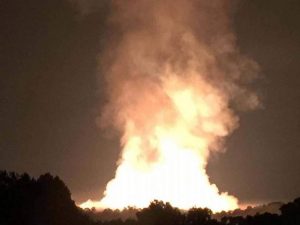
By Sharon Kellly
DeSmog.blog (6/7/18)
This morning [6/7/18], residents of Marshall County, West Virginia, awoke at 4:15 a.m. to a major natural gas rupture and explosion on TransCanada’s Leach XPress pipeline on Nixon Ridge — a quickly built pipeline only half a year old.
The fire was visible for miles, local TV news reported. Police warned anyone who could see the flames to evacuate — and the Emergency Management Agency director of neighboring Ohio County said officials had received dozens of 911 calls from locals able to see the fire, which was extinguished roughly four hours later. The blast was so powerful that one resident tolda local CBS affiliate it felt like a tornado was passing through.
No one was injured, and no property damage was reported, TransCananda said in a statement released today, adding that the cause of the explosion was not yet determined.
The Leach XPress pipeline is just six months old, having been put into service on January 1, 2018.
At the time, TransCanada emphasized that it was built quickly — but safely. “Leach XPress was done in less than a year,” Scott Castleman, manager of U.S. Gas Communications for TransCanada, said in a January statement.
“We’re looking forward to generations of safe operations,” he added. “This is truly a best-in-class pipeline and we look forward to many years of safe, reliable, and efficient operation on behalf of our customers.”

“We truly are the North American natural gas transmission company.” — President and CEO Russell K. Girling, TransCanada president and CEO.
Leach XPress is the first in a series of major TransCanada pipeline construction projects — and part of a larger sprint to build out oil and gas pipelines nationwide, spurred by an urgent push to get shale gas and oil to market.
“This is our first major pipeline in our growth portfolio,” Castleman said in January. “There’s currently about 8 and a half billion dollars in pipeline projects in the works for the U.S. and TransCanada.”
Leach XPress, a 36-inch-diameter pipeline, went into immediate heavy service after it was built. Market research firm Genscape Inc. “said in a note to clients on Thursday that the Leach XPress segment has been flowing at or just above its operational capacity through May,” Natural Gas Intelligence reported.
The 160-mile, $1.6 billion dollar pipeline project is designed to carry 1.5 billion cubic feet of natural gas a day, moving it from the Marcellus and Utica shales down to the Southeast and Gulf Coast regions. Leach XPress runs from Marshall County, about 70 miles from Pittsburgh, Pennsylvania, into Ohio, and its gas then flows into the 12,000-mile Columbia Gas Transmission pipeline system.
Sprint to Build Pipelines
TransCanada also received U.S. Federal Energy Regulatory Commission (FERC) approval for two other pipelines, the company announced on January 1, the same day that Leach XPress went into service.
The company plans to spend $3.2 billion to build the 171-mile Mountaineer XPress and the smaller Gulf XPress pipeline in Appalachia and intends to have those pipelines up and running by the end of this year.
In March, FERC rejected a request to suspend construction of these projects from three environmental groups, the Allegheny Defense Project, the Ohio Valley Environmental Coalition, and the Sierra Club, finding that their “generalized claims of environmental harm, however, do not constitute sufficient evidence of irreparable harm that would justify a stay.”
This year, pipeline companies plan to lay 14,657 miles of pipeline worldwide — roughly double the amount finished in 2017, an Oil & Gas Journal report found. Over 81 percent of those pipes will carry natural gas, the same fossil fuel in today’s pipeline blast.
And they’re planning to do it at starkly reduced costs of $5.94 million per mile, down from $7.65 million.
Meanwhile, whistleblowers at numerous pipeline companies have raised red flags about the impacts of rushed construction — including TransCanada.
DeSmog has previously reported numerous concerns raised by former TransCanada engineer Evan Vokes about construction problems and cut corners at TransCanada’s Keystone 1 and other pipelines. …
(Main image credit: Marshall County Homeland Security & Emergency Management, via Facebook.)
(Commoner Call cartoon by Mark L. Taylor, 2018. Open source and free for non-derivative use with link to www.thecommonercall.org )
*****
Former Bank Of Canada Head: Pipeline Protesters May Be Killed. So Be It.
By Andrea Germanos
Common Dreams (6/15/18)
As Canada’s controversial Trans Mountain pipeline expansion project faces ongoingopposition, the former governor of the Bank of Canada said that protesters may die but that the government should push the project through anyway.
Speaking at an event Wednesday, David Dodge said, “We’re going to have some very unpleasant circumstances,” the Edmonton Journal reported. “There are some people that are going to die in protesting construction of this pipeline. We have to understand that.”
“Nevertheless, we have to be willing to enforce the law once it’s there,” Dodge said. “It’s going to take some fortitude to stand up.”
“North American governments have shown the ‘fortitude’ necessary to kill indigenous people often enough that this is no idle threat,” — Bill McKibben.
In an interview with the Journal, he elaborated by saying, “We have seen it other places, that equivalent of religious zeal leading to flouting of the law in a way that could lead to death.”
Dodge’s comments prompted outrage from climate activists.
Author and 350-org co-founder Bill McKibben warned, “North American governments have shown the ‘fortitude’ necessary to kill indigenous people often enough that this is no idle threat,” while Canandian author Naomi Klein called the threat a “disgrace.” She added, “If the worst happens, we now know they went into this with their eyes wide open.”
Greenpeace climate and energy campaigner Mike Hudema, meanwhile, wondered if Canadian Prime Minister Justine Trudeau would weigh in on Dodge’s remarks.
Trudeau was the target of sharp criticism from environmental advocacy groups after announcing last month that the government would purchase the pipeline and expansion system, which will roughly triple the system’s capacity. That $4.5 billion buyout, commented the B.C.-based Dogwood Initiative, makes every taxpayer “partial owner of a leaky 65-year-old pipeline—and the proponent of a still uncosted oil tanker expansion project.”
Dodge, for his part, has been described as “not inclined to hold his tongue.”
His comments about the pipeline protesters come days after he accused climate activists of making it harder to enact policies to reduce greenhouse gas emissions and said Canada should “sell our hydrocarbons, which we produce, to foreigners at the highest possible market price….including the sale of bitumen from the oilsands, while demand for oil is robust and still growing.”
(This work is licensed under a Creative Commons Attribution-Share Alike 3.0 License.)

